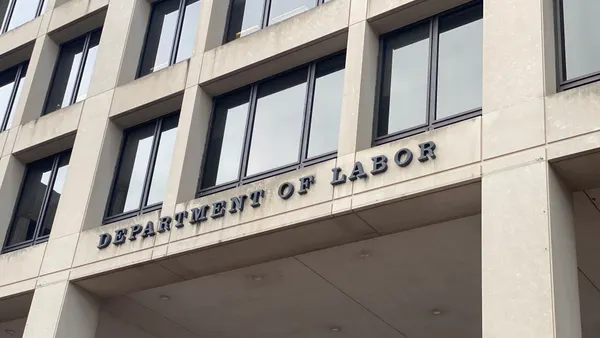Dive Brief:
- Massachusetts has passed a package bill that includes a previously proposed minimum wage hike, along with a generous paid family medical leave benefit and a permanent two-day weekend state-tax reprieve for consumers to help boost sales for businesses. Gov. Charlie Baker signed into law H.4640, which the state called the "Grand Bargain" bill, following months of negotiations among legislators and stakeholders.
- The new law incrementally raises Massachusett's minimum wage to $15 an hour over five years. The initial increase takes effect in January 2019. The minimum base wage rate for tipped workers increases up to $6.75, will also be phased-in over five years, starting in January 2019. The state will reform Sunday and holiday wage pay practices to align them with other states' policies
- Massachusett's Paid Family and Medical Leave program gives contributing employees up to 12 weeks a year to care for a family member or bond with a new child, 20 weeks a year to handle a personal medical problem, and up to 26 weeks to handle an emergency relating to a military family member's deployment. Weekly benefits will be based on a percentage of employees' average weekly wages, with $850 a week being the maximum payout. The law allows self-employed workers to opt into the program. However, for the program to cover municipal workers, cities and towns must vote to participate.
Dive Insight:
Acting independently from the federal government, states like Massachusetts have passed their own laws to raise the minimum wage.
The federal minimum wage has remained at $7.25 an hour since 2009. But most Americans favor an increase, as separate studies from Adecco and the National Restaurant Association affirm. Employers have been slow to offer significant pay increases, offering instead flexible work schedules, development opportunities and nontraditional benefits to attract and retain workers. But if the labor market tightens as predicted, more companies are beginning to see the need to raise wages to stay competitive. Feeling pressured to compete for job applicants in a tight labor market, major retailers, like Target, TJ Maxx and McDonalds, also raised their pay rates, for example.
Americans also want paid family medical leave benefits, which are proving to be a talent magnet for employers. The U.S. remains one of the few industrialized nations without a federal paid family leave policy, which advocates say would support working families. In the absence of a federal mandate, states, municipalities and companies are offering their own paid family medical or parental leave policies. In fact, a list of big-name retailers now offer paid family leave benefits to even their hourly employees to attract and retain workers.
Although minimum wage hikes and paid family medical leave are in-demand benefits for workers, the patchwork of state and local mandates are creating compliance issues for employers, especially those doing business across multiple jurisdictions. But it is unlikely there is any end in sight for these complicated expansions just yet.











